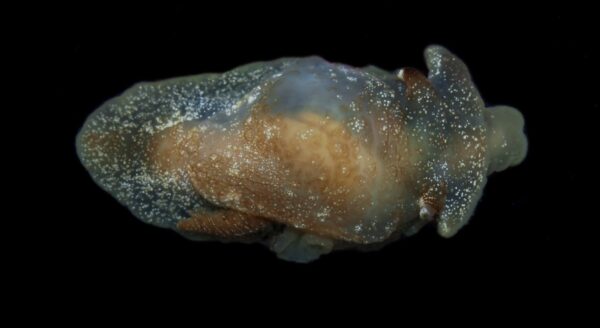An exciting discovery has been made by researchers in the waters off the southwest coast of England. A new species of sea slug, named Pleurobranchaea britannica, has been identified by scientists from the Centre for Environment, Fisheries and Aquaculture Science (CEFAS) and the University of Cadiz, Spain.
Measuring between two and five centimetres long, Pleurobranchaea britannica is a type of side-gill sea slug. Specimens of this newly classified species were collected during routine fisheries surveys conducted by Cefas, and the Instituto Español de Oceanografía in 2018 and 2019 off southwest England and in the Gulf of Cadiz, southwest Spain.
Analysis conducted by the University of Cádiz revealed that the specimens represented a new species. An examination of the DNA, as well as the identification of physical differences in the appearance and reproductive systems when compared to known species, supported the classification of Pleurobranchaea britannica as a standalone species.
The discovery marks the first recorded instance of a sea slug from the Pleurobranchaea genus in UK waters. Scientists believe that this new species could potentially be found from as far south as Spain and Portugal, around the French coast and up to the southwest of the English Channel.
A type of shell-less marine mollusc, sea slugs are an extraordinarily diverse group of animals. Being at the top of the food chain and functioning as both predators and prey, they are essential to marine ecosystems. To protect themselves from predators, several species specialise in recycling parts of the animals they prey on. For instance, absorbing toxins from certain prey and secreting the poison into their own skin. Their sensitivity to environmental changes makes them valuable indicators of ecosystem health, helping scientists understand the impacts of climate change and human activities on marine habitats.
The study, published in the Scientific journal of Zoosystematics and Evolution highlights the importance of understanding the way species shift and move through the ocean in response to changes to their environment. Scientific surveys, such as those conducted by Cefas’ research vessel, the RV Cefas Endeavour, can play an important role in collecting the data and evidence needed to understand these changes, helping to inform conservation and management efforts to protect marine biodiversity and ecosystems.
Ross Bullimore, Marine Ecologist at Cefas who collected the specimens onboard the RV Cefas Endeavour, said: “It is exciting to see that routine fisheries surveys can still lead to such discoveries. It only took a brief inspection of two specimens to be confident that we had stumbled upon a species of Pleurobranchaea. This was thrilling because no other species from this genus had been documented in UK waters, or even this far north. After close collaboration with the University of Cadiz, who carried out a more thorough assessment, we were blown away to discover that we had identified a third, new species. There is often an assumption that we know everything there is to know about species found in UK waters, but this just goes to show that there is still so much to learn in our own backyard”.
Further information and the full news release from Cefas can be read here.
